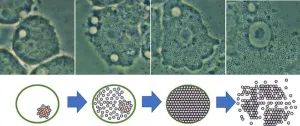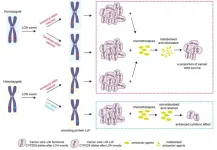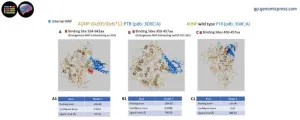(Press-News.org) (Santa Barbara, Calif.) — A remote lakeshore deep inside Yosemite National Park teems with life: coyotes, snakes, birds, tadpoles, frogs. The frogs are at the heart of this scene, which a decade ago was much different. It was quiet — and not in a good way. The frogs that are so central to this ecosystem were absent, extirpated by a deadly fungal disease known as amphibian chytrid fungus.
Now, thanks to the consistent and focused efforts of researchers and conservationists to save, then reintroduce, mountain yellow-legged frogs to this and numerous other lakes in Yosemite, their populations are again thriving.
A new landscape-scale study led by UC Santa Barbara (UCSB) biologist Roland Knapp, with colleagues from UCSB, University of Colorado, Boulder, University of Tennessee, and Yosemite National Park, details the long-term endeavor comprising 24 reintroductions across 12 different sites in Yosemite over 17 years. In that time, remarkably, the frogs have developed some resistance to the chytrid fungus, Batrachochytrium dendrobatidis (Bd), allowing them to persist in its presence. The paper is now published in the journal Nature Communications.
“Going back to some of these lakes where frogs are now recovering, and just sitting and watching, reminds you of what has been accomplished,” said Knapp, based at UCSB’s Sierra Nevada Aquatic Research Laboratory. “You sit on the bank and you have tadpoles all around you in the water and adult frogs sitting next to you on the shore. You have birds flying in and feeding on them, and snakes that are feeding on them. You have a lake that’s alive again.”
As it’s done to amphibians worldwide, Bd has devastated native frog populations in Yosemite. Once the most common amphibian in the high elevation portion of California’s Sierra Nevada mountains, during the past century the Sierra Nevada yellow-legged frog (Rana sierrae) has disappeared from more than 90% of its historical range. It is currently listed as “endangered” under the Endangered Species Act. But in their long-term study, Knapp and co-researchers were able to successfully reestablish breeding populations by translocating Bd-resistant frogs to sites where the species had been wiped out. The success of their recovery efforts is a beacon of hope for amphibian conservation.
“In our study, results from viability modeling suggest that many reintroduced populations have a high probability of persisting over 50 years,” Knapp said. “These results provide a rare example of how reintroduction of resistant individuals can allow the landscape-scale recovery of disease-impacted species, and have broad implications for amphibians and many other taxa that are threatened with extinction by novel pathogens.”
Amphibians are the most threatened vertebrate class, with more than 40% of species threatened with extinction. In less than a generation, the human-driven emergence of the amphibian chytrid
fungus (Bd) has devastated global amphibian biodiversity, with thousands of populations in decline or extirpated, and dozens of species now extinct in the wild. Even amphibians in the most protected habitats have fallen victim to what Knapp calls an “invisible killer.”
All of which makes the success of this study even more “mind-blowing,” he said. “It’s mind-blowing considering where we were 10 or 15 years ago, when we weren’t sure if we were going to have this frog on the landscape anymore, to see how things are turning around. It’s incredible to see.”
It’s taken some seriously painstaking work to get here.
The reintroductions require careful planning; when identifying the best locations for reintroduction, team members must factor site elevation, winter severity and predation risk. And monitoring the translocated frogs is an intensive, long-term effort, often requiring researchers to hike in and capture every frog at a site multiple times per year.
Monitoring those translocated populations over several years, the team observed the recruitment of new adult frogs, indicating successful recovery. Conducted within the protected confines of a national park, their efforts, Knapp noted, demonstrate the importance of maintaining and restoring natural processes in these ecosystems.
What about the prospect of scaling up this approach across the entire Sierra Nevada range — even serving as a proof of concept, and potentially as a model, for similar conservation efforts elsewhere across the globe?
“It’s really important to have that broader perspective,” said Knapp. “We now have a proven strategy that is working in Sierra Nevada yellow legged frogs and is allowing us to recover the frog at a scale of Yosemite National Park. This frog that has been pushed to the verge of extinction by this pathogen is now becoming an example of how we might recover amphibians all around the world.”
Knapp’s co-authors on the study are Mark Wilber at the University of Tennessee Institute of Agriculture; Maxwell Joseph, of CU Boulder and Planet; Thomas Smith, also of UC Santa Barbara; and Robert Grasso at Yosemite. Funding for the project was provided by the Yosemite Conservancy, National Park Service and National Science Foundation.
END
Reintroduction of resistant frogs facilitates landscape-scale recovery in the presence of a lethal fungal disease
2024-11-14
ELSE PRESS RELEASES FROM THIS DATE:
Scientists compile library for evaluating exoplanet water
2024-11-14
ITHACA, N.Y. – By probing chemical processes observed in the Earth’s hot mantle, Cornell scientists have started developing a library of basalt-based spectral signatures that not only will help reveal the composition of planets outside of our solar system but could demonstrate evidence of water on those exoplanets.
“When the Earth’s mantle melts, it produces basalts,” said Esteban Gazel, professor of engineering. Basalt, a gray-black volcanic rock found throughout the solar system, are key recorders of geologic history, he said.
“When the Martian mantle melted, it also produced basalts. The moon is mostly basaltic,” he said. “We’re ...
Updated first aid guidelines enhance care for opioid overdose, bleeding, other emergencies
2024-11-14
Embargoed until 4 a.m. CT / 5 a.m. ET Thursday, November 14, 2024
DALLAS and WASHINGTON, Nov. 14, 2024 — The American Heart Association and the American Red Cross today released the “2024 Guidelines for First Aid,” which provide critical updates that equip first aid responders with the latest evidence-based practices to effectively respond to mild, moderate and life-threatening emergencies. The guidelines are published today in Circulation, the American Heart Association’s flagship journal.
“Providing first aid care is about recognizing that an emergency ...
Revolutionizing biology education: Scientists film ‘giant’ mimivirus in action
2024-11-14
The COVID-19 pandemic led to heightened public interest in learning about viruses and how they can cause diseases. There has been a lot of focus on communicating virology concepts to the general public in order to increase awareness about the spread and prevention of viral diseases.
When it comes to teaching biology, however, how do we explain microscopic processes like viral infections to students in the classroom?
In modern science education, seeing is believing—educators are now attempting to capture the attention of students by using eye-catching visuals and videos, instead ...
Genetic variation enhances cancer drug sensitivity
2024-11-14
By exploiting the genetic variation in cancer cells, an already approved cancer drug demonstrated enhanced effects against cancer cells in specific patient groups. This is shown in a recent study from Uppsala University, published in the journal eBiomedicine. The findings suggest a potential for more individually tailored and more effective cancer therapies.
The human genome is organised in 46 chromosomes, where all but the x and y chromosomes in men are present in two copies. This means that a person with a faulty gene on one chromosome most often has a functional version on the other. But during ...
Protective genetic mutation offers new hope for understanding autism and brain development
2024-11-14
Tel Aviv, Israel, 14 November 2024 – Tel Aviv University researchers have made a remarkable discovery that could revolutionize our understanding of genetic mutations and their role in brain development. The study, published today in Genomic Psychiatry, reveals that not all genetic mutations are harmful – some may actually offer protection against developmental disorders.
Led by Professor Illana Gozes, Director, The Elton Laboratory for Molecular Neuroendocrinology, the research team identified a protective inherited mutation in the Activity-Dependent Neuroprotective Protein (ADNP) gene. This finding challenges the traditional ...
Colombia's Dr. Natalia Acosta-Baena uncovers critical link between brain development and degeneration
2024-11-14
MEDELLÍN, Colombia, November 14, 2024 - In a breakthrough that bridges the gap between neurodevelopment and neurodegeneration, Dr. Natalia Acosta-Baena has identified a novel genetic syndrome that reshapes our understanding of brain disorders. Her research, featured in the latest Genomic Press Interview, reveals how a single gene involved in neuronal transport can influence both brain development and degeneration.
Dr. Acosta-Baena's discovery of a SPAG9 variant's role in both processes challenges the traditional view that neurodevelopmental disorders and neurodegeneration operate through distinct pathways. ...
How can we reduce adolescent pregnancies in low- and middle-income countries?
2024-11-14
Many young girls in low- and middle-income countries become pregnant early, which can be dangerous for them and for their babies. Studies show that girls who stay in school are less likely to get pregnant at a young age. Financial support can encourage girls to stay in school and delay pregnancy and marriage in some settings. However, a new large study from Zambia found that two years of financial support combined with comprehensive sexuality education and community dialogue meetings, moderately reduced ...
When sun protection begets malnutrition: vitamin D deficiency in Japanese women
2024-11-14
Vitamin D, an essential nutrient, is naturally produced through sun exposure and certain foods. However, excessive sunburn prevention measures are causing a severe problem of vitamin D deficiency, particularly among young women in Japan.
Since vitamin D deficiency is also related to pregnancy-induced hypertension and low birth weight in children, it is important to quickly identify those at high risk and provide appropriate health guidance. However, the method currently established for measuring serum vitamin D levels is expensive and ...
Cannabis use can cause chromosomal damage, increasing cancer risk and harming offspring
2024-11-14
Cannabis use causes cellular damage that increases the risk of highly cancerous tumours, according to a new paper published in the scientific journal Addiction Biology. The paper describes cannabis as a “genotoxic” substance because it damages a cell's genetic information, which can lead to DNA mutations, accelerated aging, and cancer. To make matters worse, this genotoxicity may be transmitted via damaged egg and sperm to the cannabis user’s offspring, making the risk of cannabis ...
Survey finds many Americans apply misguided and counterproductive advice to combat holiday weight gain
2024-11-14
Orlando, Fla - For those striving to maintain a healthy lifestyle, holiday celebrations can feel like a minefield of dietary pitfalls, bound to derail the progress you’ve made through diet and exercise the rest of the year. In fact, a new national survey by Orlando Health finds nearly two in five (39%) Americans worry about how much they eat over the holidays. The good news is that dietitians say there’s no need to feel guilty about a few holiday treats.
“Holidays come around once a year, and indulging in a few traditional foods and favorite recipes that may have a little extra ...






